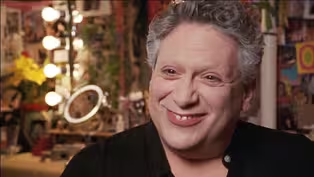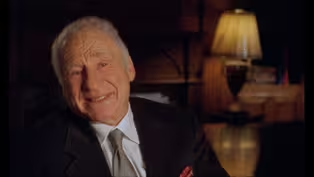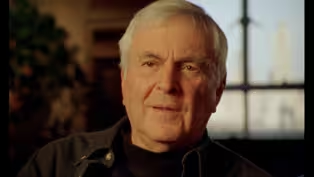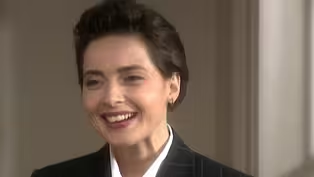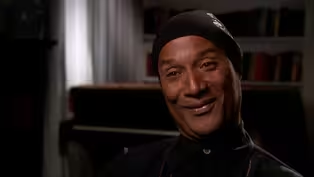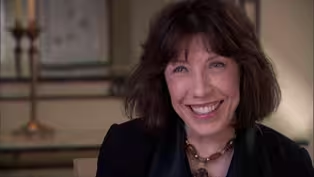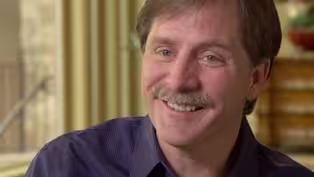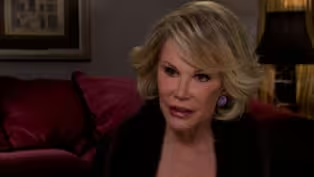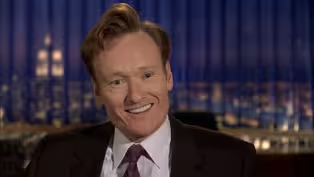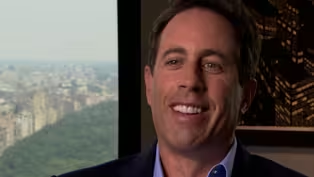
How Phyllis Diller broke down the doors for female comics
Special | 11m 35sVideo has Closed Captions
Phyllis Diller reflects on how her comedy was a response to years of “take my wife” jokes.
On September 19, 2007, Phyllis Diller reflected on how her comedy was a response to years of “take my wife” jokes. Interview conducted by director Michael Kantor for the six-hour PBS comedy series, “Make ‘Em Laugh: The Funny Business of America” (2009).
Problems playing video? | Closed Captioning Feedback
Problems playing video? | Closed Captioning Feedback
Support for American Masters is provided by the Corporation for Public Broadcasting, AARP, Rosalind P. Walter Foundation, Judith and Burton Resnick, Blanche and Hayward Cirker Charitable Lead Annuity Trust, Koo...

How Phyllis Diller broke down the doors for female comics
Special | 11m 35sVideo has Closed Captions
On September 19, 2007, Phyllis Diller reflected on how her comedy was a response to years of “take my wife” jokes. Interview conducted by director Michael Kantor for the six-hour PBS comedy series, “Make ‘Em Laugh: The Funny Business of America” (2009).
Problems playing video? | Closed Captioning Feedback
How to Watch American Masters
American Masters is available to stream on pbs.org and the free PBS App, available on iPhone, Apple TV, Android TV, Android smartphones, Amazon Fire TV, Amazon Fire Tablet, Roku, Samsung Smart TV, and Vizio.
Buy Now
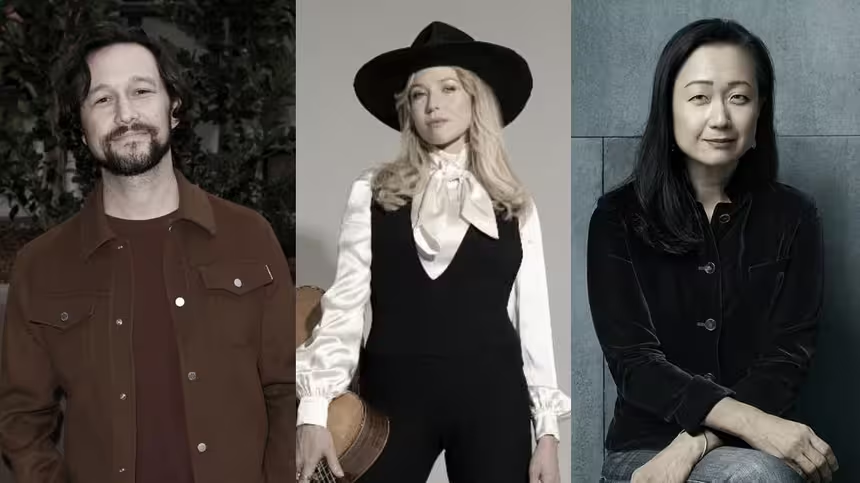
A front row seat to the creative process
How do today’s masters create their art? Each episode an artist reveals how they brought their creative work to life. Hear from artists across disciplines, like actor Joseph Gordon-Levitt, singer-songwriter Jewel, author Min Jin Lee, and more on our podcast "American Masters: Creative Spark."Providing Support for PBS.org
Learn Moreabout PBS online sponsorshipMore from This Collection
Watch curated interviews from The American Masters Digital Archive. The full collection includes over 1,000 hours of never-before-seen, raw interviews: a treasure trove of the movers and shakers of American culture, including Maya Angelou, Patti Smith, Mel Brooks, Carol Burnett, Matthew Broderick, Carl Reiner, Joan Rivers, Dionne Warwick, Lee Grant, Sidney Lumet, Betty White and many others.
Harvey Fierstein on gay representation on Broadway and its deep history
Video has Closed Captions
Harvey Fierstein talks to director Michael Kantor backstage during the production of "Hairspray." (13m 8s)
Video has Closed Captions
Ringo Starr describes his friendship with Mae West. (10m)
Mel Brooks' wild ride to his first Broadway show ever
Video has Closed Captions
Mel Brooks talks about the first Broadway show he ever saw—Cole Porter's "Anything Goes." (5m 44s)
John Kander and Fred Ebb on “Cabaret,” creativity and collaboration
Video has Closed Captions
Composer John Kander and lyricist Fred Ebb talk about how they have worked together. (5m 56s)
Isabella Rossellini compares her acting and modeling
Video has Closed Captions
Isabella Rossellini discusses her acting versus modeling career. (28m 24s)
Quincy Jones explains how he got started in music
Video has Closed Captions
Quincy Jones discusses his early career, friendships and how he defines himself. (15m)
Paul Mooney on his career and relationship with Richard Pryor
Video has Closed Captions
Paul Mooney reflects on the mechanics of stand-up and his role as Richard Pryor's best friend. (10m 39s)
How Lily Tomlin found liberation in exploring her Laugh-In characters
Video has Closed Captions
Lily Tomlin speaks about her time on Laugh-In and how she developed her characters. (12m 35s)
Jeff Foxworthy on how every American might be a "redneck"
Video has Closed Captions
Jeff Foxworthy discusses regionalism in comedy and why "redneck" is a state of mind. (15m 41s)
Joan Rivers finds humor in being yourself
Video has Closed Captions
Joan Rivers speaks about her experience as a female comic in the early 60s. (9m 59s)
Conan O’Brien gets serious about silliness
Video has Closed Captions
Conan O’Brien speaks about his style of late night and his reason for doing comedy. (15m 32s)
Jerry Seinfeld on his place in American sitcom history
Video has Closed Captions
Jerry Seinfeld discusses his collaboration with Larry David and the evolution of the sitcom. (16m 1s)
Providing Support for PBS.org
Learn Moreabout PBS online sponsorship- Where does comedy come from?
Life!
Life!
Comedy is based on tragedy.
If there is no tragedy, the smaller the better, there is no comedy.
If everything goes right, nothing's funny.
When you look back at the famous lady comics, or even lady actresses, they either had a nose that was too big, a mouth too big, buck teeth, no chin, funny hair (laughs) in my case.
And when I first got started, I really was ugly.
My nose was crooked, my teeth were crooked, and I didn't know anything about makeup, and my hair was wrong.
So that all helped!
You see, because, number one, already they pitied me.
(laughs) Now when a young girl comes out, and she's pretty, great figure, what's she going to beef about?
She has nothing to bitch about!
And all comedy is bitch bitch bitch.
And if she has something to talk about, it'll be about her mommy or her doggy, or her teacher or her boyfriend.
I mean, how deep does this go?
My face wasn't really ugly, but it was dysplastic.
It wasn't the girl who gets the lead in the high school play.
I always got the funny role.
So, my nose was too long, number one, it had been broken in a car accident.
And when I smiled, I had no upper lip.
Funny thing is, this doc, my wonderful doctor who did my facelift, I didn't even mention my nose.
I probably didn't even know it was way too long.
It was witch, it was a witch nose.
And every time anyone needed a witch, I got the role.
Does that tell you anything?
Yes, it does.
I did the Wizard of Oz and played the Wicked Witch of the West with my own nose!
They were a matter of evolution, the way I looked, my look.
I started out looking like the girl next door.
And you don't have to pay to look at that mess.
You know, you can look at that free.
So I little by little got showbiz.
Then I made my hair blonde, and learned about makeup.
And I am totally in love with fashion, and have been from birth.
So of course when I got into dressing for the stage, I really got into that, and loved it.
I invented the little boots so that they hit my leg at the skinniest point.
So my legs were supposed to look like toothpicks, and I always wore the gloves.
All clowns wear gloves.
All clowns!
Mickey Mouse.
And I couldn't walk on stage without those gloves.
Then I was ready.
It was kind of a psychic thing.
- [Interviewer] And the cigarette holder?
- That, remember, a lot of the male guys had a cigar.
It's something to do with one of your hands.
And when anyone gets up to do any kinda speaking, what am I gonna do with my hands?
But a lot of the guys used a cigar as a prop.
And I, at first, when I first got into dressing for the stage, used very chic Chanel suits, evening suits.
And I went for that 1929 flapper look.
And they always had a cigarette holder.
And it also gave me a reason to hold up my right hand.
If you wanna stop a train, if you wanna go leave the classroom, if you wanna get someone's attention.
And so you see, and I used it as chopsticks, and I used it to show hostility.
There were people alive today who will swear they saw ashes fall off it.
Of course, it was wood.
I'm very much against smoking.
But my persona came gradually from working.
I learned it from the audience.
I learned from the audience that they didn't want me to be a (indistinct) or chic or ...
I had a director who was directing me, in a way that I would've been mainly outta work.
When I started writing my own material from my own life, my real life, of having a lot of kids, a lot of housework, a lot of kitchen, a lot of cooking.
I had in-laws, I had stuff to hate.
I had neighbors.
(laughs) You know what I mean?
It went deep, and the audience adored.
I was talking about the things that women were dealing with in those days, like ironing.
Ironing is obsolete!
But boy, what a thing it was for me.
Do I think I had to make fun of myself?
Well, it was such a natural, 'cause, you know, I just looked in a mirror and went out, and I'm gonna help them laugh.
And I have to give myself credit for being very sensitive to the audience.
They taught me everything.
They taught me everything.
And I was always with the audience.
I worked with people who didn't make it, whose material was esoteric, brilliant, and so far out.
But they die broke.
- [Interviewer] When you started out, there was nobody making fun of that domestic life, right?
It was always, you know, take my wife, please.
Tell me about, why do you think people were so tuned into that?
- Number one, they had never heard the other side of the story.
It was always, "My wife's so neat, I got up to go to the toilet, got back the bed was made."
You know, it was, they heard all those jokes, and it was always the man's mother-in-law.
Now it's my mother-in-law!
It's his mother, his sister.
(laughs devilishly) And, well you know my first supporters, well the first were gay guys, because they all want to be funny and chic.
I was funny and chic.
The next was women, 'cause I was talking to women.
I was talking about what women were going through at the time.
The last for me to gather around would be the men.
Straight guys.
It was their wives who made them come and look at me, and I was so funny that it didn't matter anymore.
They had to like me.
Oh, I had one time when Colonel Sanders came to the show.
I said that Colonel Sanders brought out a package of chicken in my honor.
It had no breasts.
(laughs) 'Cause I had so many breast jokes, and leg jokes.
And I would show my legs and say, you know, like Marlene Dietrich, her legs were insured for a million dollars with Lloyds of London.
And then I would show my legs and say, "Allstate."
These are the jokes!
But you see, they're all self depreciating.
But they work.
And they show your audience, "Look, I'm no diva.
I'm one of you.
We're talking to each other.
We're talking about real life."
I never felt anything from the men, you know, but support.
And I never ran into anything because I was a woman.
Maybe they weren't sure.
(laughs) I was madly in love with Bob Hope.
I loved all the radio shows.
If they were, like the Fibber McGee and Molly.
I couldn't wait till they opened the closet door and everything came falling out.
But Robert had seen me on Jack Paar Tonight Show, and was interested.
And I was playing a terrible place in Washington, DC, and he was there, as he said, to visit his money.
And he was sitting around with some of his old buddies and he got 'em all together and made 'em come and look at me because he wanted to see me live.
And I was in a place I shouldn't have been, because they were all salesman and hookers.
And my material was about house-wifing, ironing, babies, mother-in-law.
Well, of course I bombed.
He saw me bomb!
But, gotta give old Robert credit.
He saw a professional doing a professional act, good material, and realized what was wrong.
No way I could make it with this group!
And so he met me, bombing, and he, I tried to sneak out, and he jumped up and came over and told me that I was great.
That was my turning point.
It wasn't work.
He was having fun.
He was crazy.
He loved working with Bing Crosby, and he loved working with him, anytime he did a movie or a special, it was just honest to god fun.
And over the years, he had put together such a well-greased organization that it was fun.
It all just went, it worked.
His nickname was Rapid Robert.
'Cause everything was fast, do it once.
He liked to get it in one take.
And it was, with him it was an art, and it was mathematics.
Everything was setup, payoff.
Well, you know, the shortest distance between two laughs is a one-liner.
(chuckles) The worst thing in the world the amateurs do is elongate.
They'll take a perfectly good, short joke, and make it into a book.
You know why?
They get the attention, 'cause it's etiquette.
If someone starts a joke, you've all gotta listen.
They're not used to that.
So they, oh my, that's why they keep making it longer and longer, 'cause they're enjoying the total attention.
But they get a bigger laugh if they just get on with it and get to the punchline.
(bright melody)
Support for PBS provided by:
Support for American Masters is provided by the Corporation for Public Broadcasting, AARP, Rosalind P. Walter Foundation, Judith and Burton Resnick, Blanche and Hayward Cirker Charitable Lead Annuity Trust, Koo...

